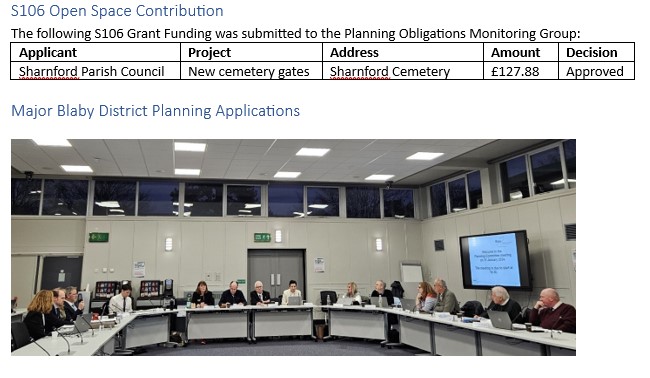
July 2024
General Election Results for United Kingdom
Number of successful candidates per party
Labour won 411 seats, up 209 on their total from the 2019 election.
The Conservatives won 121 seats, down 244 from their 2019 total of 365 seats. The Liberal Democrats gained 61 seats for a total of 72, while the Scottish National Party won nine seats, down from 48 in 2019.
Reform UK won five seats and the Green Party of England and Wales won four. Sinn Féin won seven seats in Northern Ireland (unchanged on 2019), while the Democratic Unionist Party won five (down three on 2019).
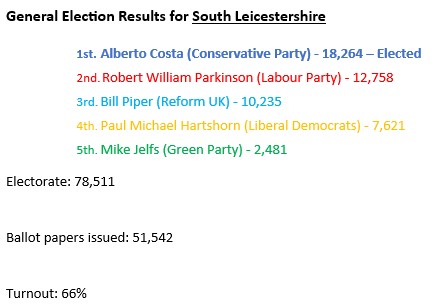
With a new Government in power, we will monitor any changes in legislation and policy that will Impact Blaby District Council and report back to our residents.
Around the District
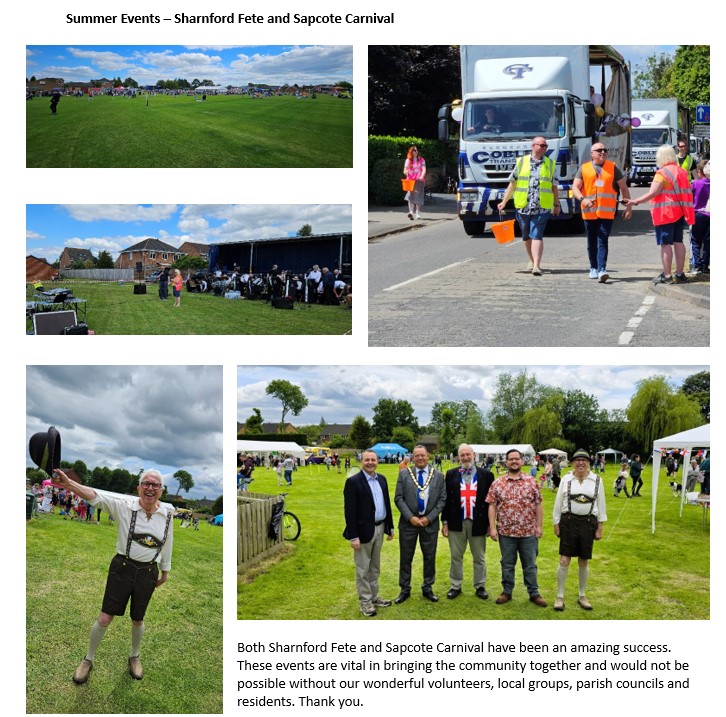
Both Sharnford Fete and Sapcote Carnival have been an amazing success. These events are vital in bringing the community together and would not be possible without our wonderful volunteers, local groups, parish councils and residents. Thank you.
The Planning System and Public Opinion: A Critical Perspective
In the development world, planning decisions often spark heated debates, particularly when large-scale projects face significant public opposition. A recent controversy surrounding Blaby District Council’s approval of the Enderby Logistics Hub in Leicestershire highlights this issue. Despite receiving over 2,600 objections, the council approved the project, leading to allegations of corruption and intense public outcry.
The Role of Public Participation in Planning, like it or loathe it, public participation is a cornerstone of the planning process, designed to ensure that the voices of local communities are heard. However, the effectiveness of this participation is often questioned, especially when unpopular decisions are made. The approval of the Enderby Logistics Hub serves as a case in point.
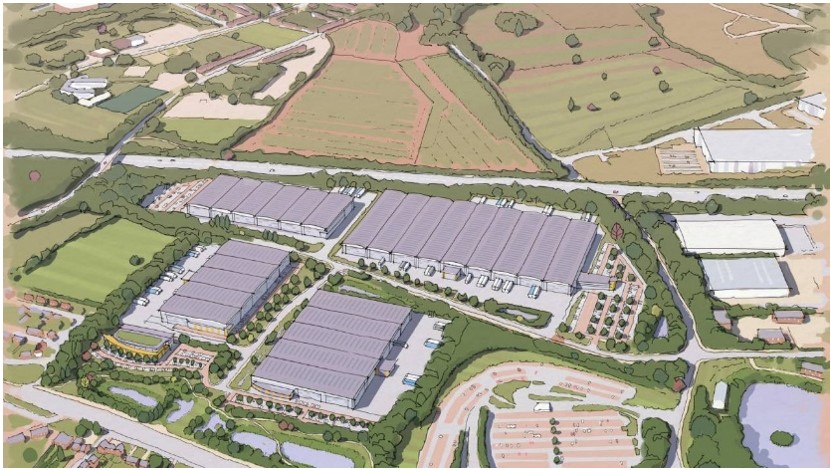
Critics argue that the council ignored widespread opposition, fuelling suspicions of corruption and undermining trust in the planning system.
Yet, it's essential to recognize that public opposition alone should not dictate planning outcomes. The planning process is complex, balancing various factors including economic benefits, environmental impact, and long-term strategic goals. While community input is crucial, planning decisions must also adhere to legal frameworks and planning policies, which may sometimes lead to unpopular but necessary outcomes.
The Allegations of Corruption
The accusations of corruption in the case of Blaby District Council stem from the belief that the council prioritised corporate interests over community welfare. Such allegations are serious and can damage the credibility of local authorities. However, it is important to differentiate between unpopular decisions and actual corruption.
Corruption involves dishonesty or illegal behaviour by those in power, often for personal gain. In the context of planning, this would mean approving developments in exchange for bribes or other illicit benefits. Without concrete evidence, accusing a council of corruption simply because it made an unpopular decision is unfair and detracts from constructive dialogue.
Blaby District Council defended its decision, stating that due process and planning law were followed. This defence underscores the importance of transparency and accountability in the planning process. Local authorities must ensure that their decisions are well-documented and justified based on planning regulations and policies, not merely public opinion.
Just how many popular refusals have we all sat through - only to go on to winning a case on appeal...months later?
The Complexity of Planning Decisions
Planning decisions involve a delicate balancing act. Councils must consider various factors, including:
- Economic Benefits: Developments like the Enderby Logistics Hub can bring significant economic benefits, including job creation and increased local revenue. These benefits can outweigh the concerns of local residents, especially if the project aligns with broader economic strategies.
- Environmental Impact: Environmental considerations are crucial in planning decisions. Councils must assess the potential impact on local ecosystems, pollution levels, and sustainability. In some cases, developments may be approved despite environmental concerns if mitigation measures are in place.
- Social Equity: Planning decisions should promote social equity, ensuring that developments benefit the broader community and do not disproportionately harm vulnerable groups. This aspect often involves difficult trade-offs and can lead to contentious outcomes.
- Policy Frameworks: Councils must operate within legal and policy frameworks, which sometimes necessitate decisions that are unpopular. Adhering to these frameworks ensures consistency and fairness in the planning process. In many cases, the policies the Council are adhering to are the subject of far earlier rounds of public consultation.
The Importance of Good Planning
Good planning is not always popular.
Effective urban and rural planning requires making decisions that balance immediate community concerns with long-term benefits. This often involves approving projects that face significant opposition but offer substantial economic, social, or environmental benefits.
The case of the Enderby Logistics Hub illustrates this challenge. While the development faced substantial opposition, the council likely considered its potential economic benefits and alignment with strategic planning goals. Dismissing such decisions as corrupt without understanding the broader context undermines the integrity of the planning process.
Enhancing Trust in the Planning System
To enhance trust in the planning system, local authorities must prioritise transparency, accountability, and public engagement. Here are some steps to achieve this:
- Transparent Decision-Making: Councils should provide clear, accessible information about their decision-making processes, including how public input is considered. Detailed explanations of how decisions align with planning policies can help demystify the process.
- Robust Public Engagement: Effective public engagement goes beyond merely collecting objections. Councils should actively engage with communities, addressing concerns and incorporating feedback where possible. This approach fosters a sense of inclusion and trust.
- Accountability Mechanisms: Establishing robust accountability mechanisms, such as independent reviews and appeals processes, can ensure that planning decisions are fair and transparent. These mechanisms can also address allegations of corruption more effectively.
- Educational Initiatives: Educating the public (not just councillors) about the complexities of the planning process and the factors that influence decisions can mitigate misunderstandings and reduce unwarranted allegations of corruption.
Conclusion
We are almost certainly about to go through (yet another) reform of the planning system.
The planning system faces significant challenges in balancing public opinion with the need for strategic, long-term decision-making. While public participation is vital, it should not override the objective assessment of planning applications based on legal and policy frameworks. Allegations of corruption should be taken seriously, but it's equally important to distinguish between unpopular decisions and actual misconduct.
Good planning decisions are not always popular, but they are essential for sustainable urban development. By enhancing transparency, accountability, and public engagement, local authorities can rebuild trust in the planning system and ensure that decisions are both fair and effective. The case of the Enderby Logistics Hub serves as a reminder of the need for a balanced approach that considers both community concerns and broader strategic goals.
At this moment, changes to the planning system are about to happen. Better education, better understanding and - dare I say it - some consideration of the greater good not just individual or selfish 'back yard' views may be overdue.
Managing Director & Business Owner at AMS Planning with expertise in Planning, Development and Sustainability. Author of Newsletter 'Planning at the Coalface' and Owner of the Rural Planning and Diversification Group
Children enjoying the new Bouskell Park Trail
The trail sits alongside the usual tours organised by Blaby District Council during the summer so any youngsters who accompany adults can take advantage of this extra offering.
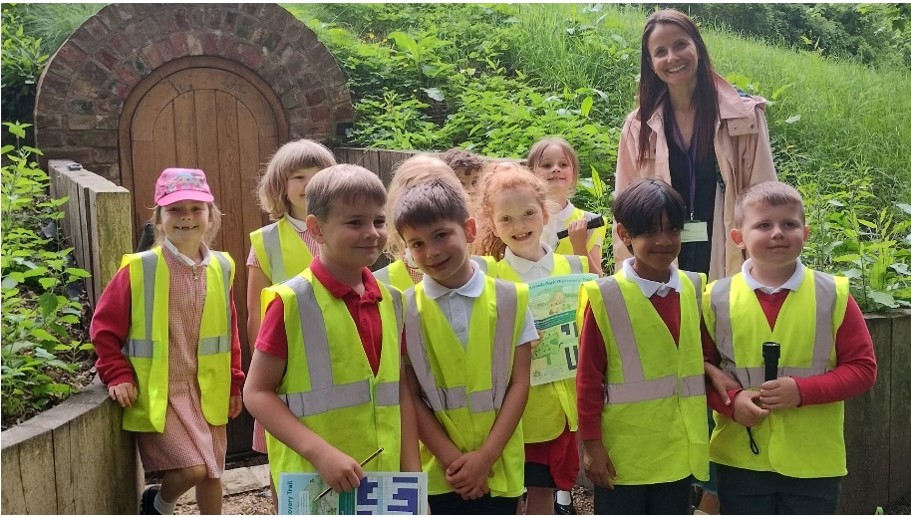
Featuring an activity map with clues to solve the trail is the brainchild of tour guide Jo Thomson.
She said: “I had a couple of children on the adult tour and although they were interested it was quite a lengthy and in-depth tour for them. So, I thought I could break it down and make it more activity based to appeal specifically to children.”
The new offering has been well received by Year 1 and 2 pupils from Thistly Meadow Primary school who have trialled the trail – especially since the Ice House seems to have attracted some resident frogs.
Councillor Activities
During June there have been many training events, meetings, and social events, attended by one or both of your councillors but with some changes /cancellations due to the General Election.
- Hayes Garden Project Consultation – 4th
- Aston Flamville Parish Meeting – 5th
- Scrutiny Task & Finish – Active Travel – 6th
- Sharnford Village Fete – 9th
- Planning Committee – 13th
- Sapcote Parish Council – 13th
- Hayes Garden Project Consultation -
- Police Beat Surgery – 17th
- Wigston Parva Parish Meeting – 17th
- Local Plan Briefing – 20th
- Sharnford Parish Council – 20th
- Sapcote Carnival – 22nd
- Sharnford Bacon Buttie – 22nd
During July there are the following training events, meetings, and social events, that will be attended by one or both of your councillors:
- General Election – 4th
- Sapcote Parish Council – 11th
- District Council – 16th
- Sharnford Parish Council – 18th
- Local Plan Briefing – 22nd
- Planning Committee – 25th
- Audit & Corporate Governance Meeting – 30th
News
- Consultation on plans to protect historic core of Braunstone Village
- Coffee morning regulars rally for commemoration ceremony
- New children’s trail brings Bouskell to life
- Completion of new affordable housing development celebrated
HNRFI Update – Examination
The Hinckley National Rail Freight Interchange will remain in our monthly reports until the final decision is made by the Secretary of State
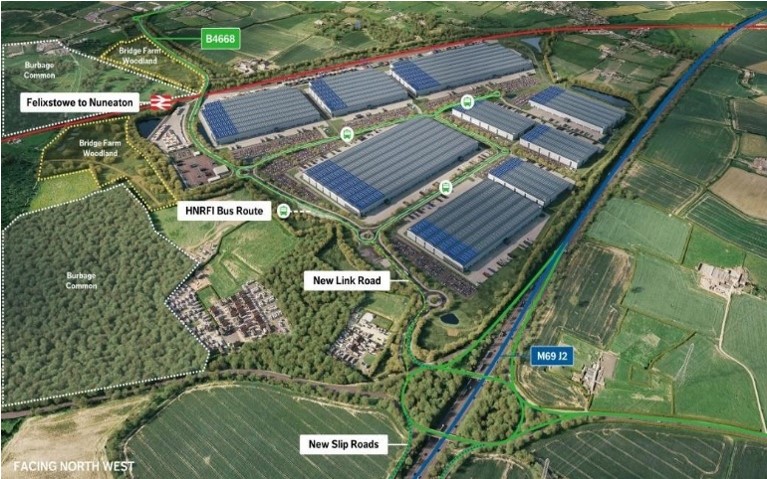
Executive Summary
Overview
An application has been made by Tritax Symmetry (formerly DB Symmetry) to the Secretary of State for Transport for a Development Consent Order (DCO). The development is a Nationally Significant Infrastructure Project (NSIP) and is called the Hinckley National Rail Freight Interchange (HNRFI).
HNRFI update – Examining Authority’s recommendation sent to Secretary of State
The Examining Authority, the Inspectors appointed to examine the proposed Hinckley National Rail Freight Interchange (HNRFI), have sent their Recommendation Report to the Secretary of State for Transport. This means the recommendation phase has ended and we are now into the decision phase of the HNRFI.
The Secretary of State will take the Recommendation Report into account when making their final decision and will publish the report along with their own decision letter by 12 September 2024
New Local Plan
As promised last month, we are now entering the final stages of our new local plan and will keep you updated with progress.
Over the next six months your district councillors will attend multiple workshops/ meetings as part of the new plan, these include policies and site allocations, leading to a public consultation at the end of the year.
If you do have any queries, please reach out to us.
23/1066/OUT - Land To The West Of St Johns (B4114), Enderby
Outline application for a commercial development consisting of the erection of warehousing with ancillary offices and gatehouses (Use Class B8) and General Industrial buildings (Use Class B2) with access off Leicester Lane, landscaping and associated infrastructure. All matters reserved, except for the access.
Application Approved by Planning Committee on 13th June 2024
23/0624/HYB – Land West Of Glenfield Hospital, Leicester Road, Glenfield
Hybrid planning application comprising: Outline application for the construction of new wards and associated facilities with all matters except access reserved; Full application for a new service and emergency access road and associated infrastructure.
Application Approved by Planning Committee on 13th June 2024
23/1067/FUL – Unit 82, The Whittle Estate, Cambridge Road, Whetstone
New testing facility building (82D) including offices and control rooms, associated battery store building, new warehouse, side extension to blocks 82B & 82C (Power Bulge), relocation of existing temporary store buildings, ancillary buildings and external works.
Application Approved by Planning Committee on 13th June 2024
24/0317/FUL - 1A George Street, Enderby
Single storey side extension, along with change of side elevation window to a French door (Part Retrospective)
Application Approved by Planning Committee on 13th June 2024
24/0318/LBC - 1A George Street, Enderby, Leicester
Single storey side extension, along with change of side elevation window to a French door (Part Retrospective)
Application Approved by Planning Committee on 13th June 2024
24/0511/OUT - Land North Of Leicester Road Sapcote
Outline Application for the residential development of up to 80 dwellings and associated infrastructure (all matters reserved except access).
Local Minor Planning Applications
24/0424/HH - 18 Stanton Road Sapcote Leicester Leicestershire LE9 4FQ
Single storey front extension and new roof to the porch and garage.
24/0554/FUL - Springfield Farm Donkey Lane Sapcote Leicester Leicestershire
Conversion of outbuildings to two residential dwellings (Class C3), change of use of land to residential garden and parking.
Planning Enforcement
E24/0159/NCAP - 55 Harecroft Crescent, Sapcote, Leicester, Leicestershire, LE9 4FX,
Nature of Breach - Extension not built in accordance with approved plans 23/0786/HH
PDF version of this newsletter can be downloaded from the link below.




